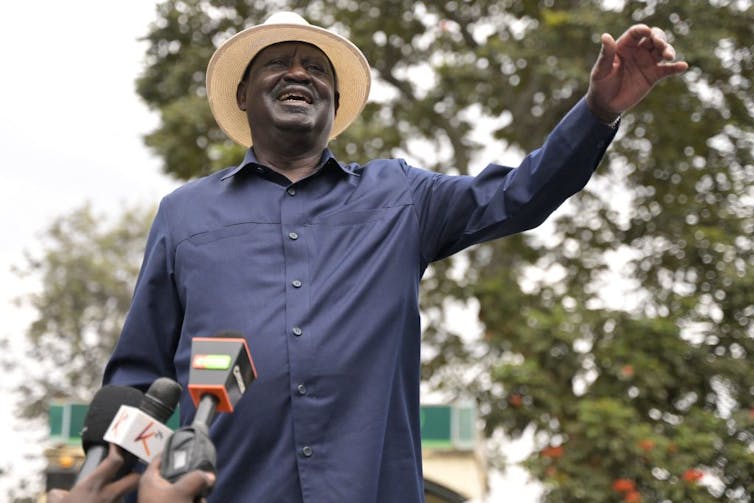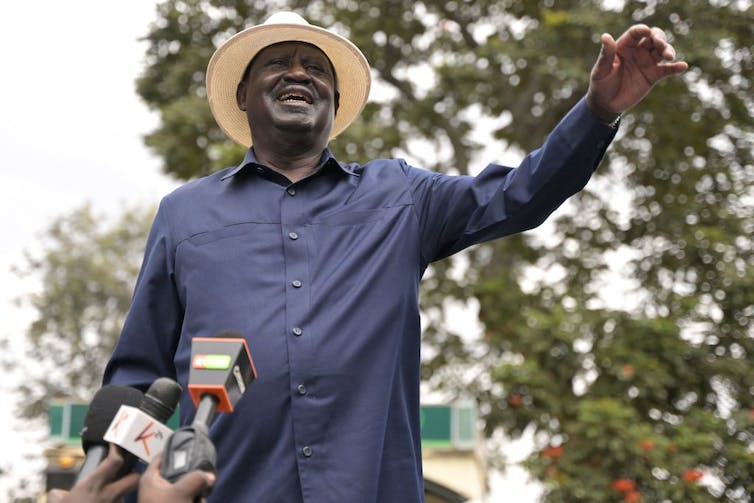
Since Kenya’s presidential election in August 2022, the new government has been in conflict with the opposition.
In democratic systems, such conflict is healthy; it can enhance governance. But it must not interfere with the government’s ability to perform its constitutional functions.
In Kenya, the friction between the government and opposition led to mass protests in March 2023. The opposition organised them around rising taxes and the high cost of living.
If carried out peacefully, political protests can deepen democracy. Kenya’s have often deteriorated into violence, however. Heavy-handed government interventions have then created even more violence. This threatens the sustainability of the country’s democratic institutions.
The opposition recently called off street protests to engage the government in dialogue. I have studied democratisation and political economy in Africa for more than two decades, and in my view, these talks are an opportunity to strengthen Kenya’s democratic systems.
Both the government and the opposition have a duty to work towards creating a Kenya in which all citizens can live peacefully, by the values that are important to them, and elect who they want.
But for this to happen, each party to the talks must understand its constitutional role. It must play its part constructively and within the law. The opposition should be a check on the exercise of government power, but it must not obstruct governance. The opposition should evaluate public policy and offer alternatives, but allow the government to formulate the national agenda.
On the other hand, the government must recognise the important role the opposition plays in a democratic system. An effective opposition provides the government with feedback that advances national objectives. It contributes positively to peaceful coexistence, the protection of human rights and national development.
The importance of the talks
The opposition suspended its call for mass protests in July 2023 to engage in dialogue with the government. The talks will be facilitated by former Nigerian president Olusegun Obasanjo. Opposition leader Raila Odinga wants the talks concluded in just over seven weeks.
Odinga’s team of five has tabled five issues. It wants the government to:
- address the cost of living
- reconstitute the elections agency
- audit the 2022 poll
- prevent state interference with political parties
- resolve outstanding constitutional issues.
The government also brings a five-member team. Its list includes establishing the offices of the leader of opposition and prime cabinet secretary, as well as implementing gender diversity laws. President William Ruto has said he has no interest in reopening debate on the results of the 2022 election.
These talks are a welcome sign of Kenya’s democracy maturing. But as the ruling party, Kenya Kwanza, has reminded the opposition coalition, Azimio la Umoja, that the opposition’s job is to analyse government policies and offer alternatives. It is not to force its economic and political agenda on the government.
Regardless of what is on the table for discussion, the dialogue should enhance governance and promote national development.
Parties to the talks should:
- consider ways to enhance government efficiency, accountability and productivity
- concentrate on creating jobs, fighting inflation and helping Kenyans deal with climate change and other development challenges
- help Kenya strengthen its democratic institutions, and promote their growth and maturity
- provide an institutional environment within which all Kenyans, regardless of their ethnic affiliation, can live together peacefully.
Understanding the roles
In emerging democracies, such as Kenya’s, a key source of conflict is the failure or inability of the government, the opposition and their supporters to understand and appreciate the roles that the constitution gives them.
In a functioning democratic system, the opposition is part of the governance architecture. It makes sure that the government is open, transparent and accountable to both the people and the Constitution. However, it must not frustrate or interfere with government.
The government must consult and interact peacefully with all stakeholders, not just its supporters. This is critical in a country like Kenya which has a significant diversity of people, cultures, values, languages and economic and social aspirations.
A misunderstanding of roles could paralyse the government and make it non-functional.
Way forward
The present dialogue’s function must be:
- to strengthen the government, not cripple it
- to advance the interests of all Kenyans, not just of specific politicians or ethnic groups
- to improve the rule of law, not to open up political spaces for the benefit of opposition leaders
- to build the country’s democracy, not to tear it down
- to unite Kenyans, not to divide them
- to ensure the advancement of a peaceful and productive Kenya.
Kenya’s national leaders – both in government and opposition – must build a political system in the country that advances inclusive development.
***
John Mukum Mbaku, Professor, Weber State University
This article is republished from The Conversation under a Creative Commons license.





